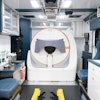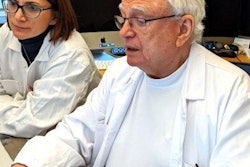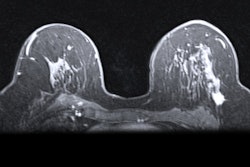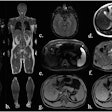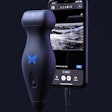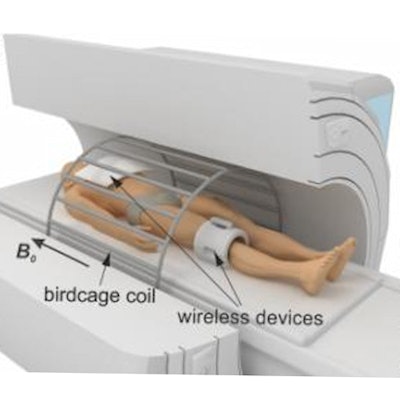
A group of Russian scientists have developed a device that can enable existing MRI scanners to perform breast MRI without the need for specialized breast coils. They shared their results in research published online on 31 July in Nature Communications.
Researchers led by Alena Shchelokova, PhD, of ITMO University in St. Petersburg, Russia, have created a targeted clinical MRI concept and applied it to breast imaging. Their method is based on a local redistribution and passive focusing of the body coil's radiofrequency magnetic field via electromagnetic coupling with an additional, ceramic-based dielectric resonator that surrounds the target area, according to the authors.
"The approach offers the prospect of a targeted MRI and brings novel opportunities for high quality specialized MR examinations within any existing MR system," they wrote.
Made by a company in St. Petersburg, the resonator is made from a special type of ceramics material that has high dielectric permittivity and low dielectric losses, according to the researchers. When set to work in the frequency of the scanner, the device localizes and increases the magnetic field in the breast. The excitation and reception of the signal are still conducted by the body coil.
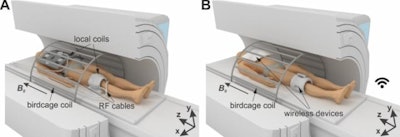 A group of Russian scientists has proposed a device that can be used to update existing MRI scanners, allowing for breast MRI to be conducted using standard scanners without specialized radiofrequency receive coils. Image courtesy of Nature Communications.
A group of Russian scientists has proposed a device that can be used to update existing MRI scanners, allowing for breast MRI to be conducted using standard scanners without specialized radiofrequency receive coils. Image courtesy of Nature Communications.Rather than generating or receiving the signal, the device only focuses the magnetic field in a specific place and then transmits the energy of excited protons to the large coil, according to the researchers. As the electromagnetic field is now concentrated inside the area of the interest, the body coil's power can be turned down, enabling the MR examination to become safer for patients, the authors noted.
The researchers said that the device is cheaper than the specialized breast coil provided by manufacturers. It's also wireless, durable, and compatible with all models of standard clinical MRI scanners, according to the authors.
